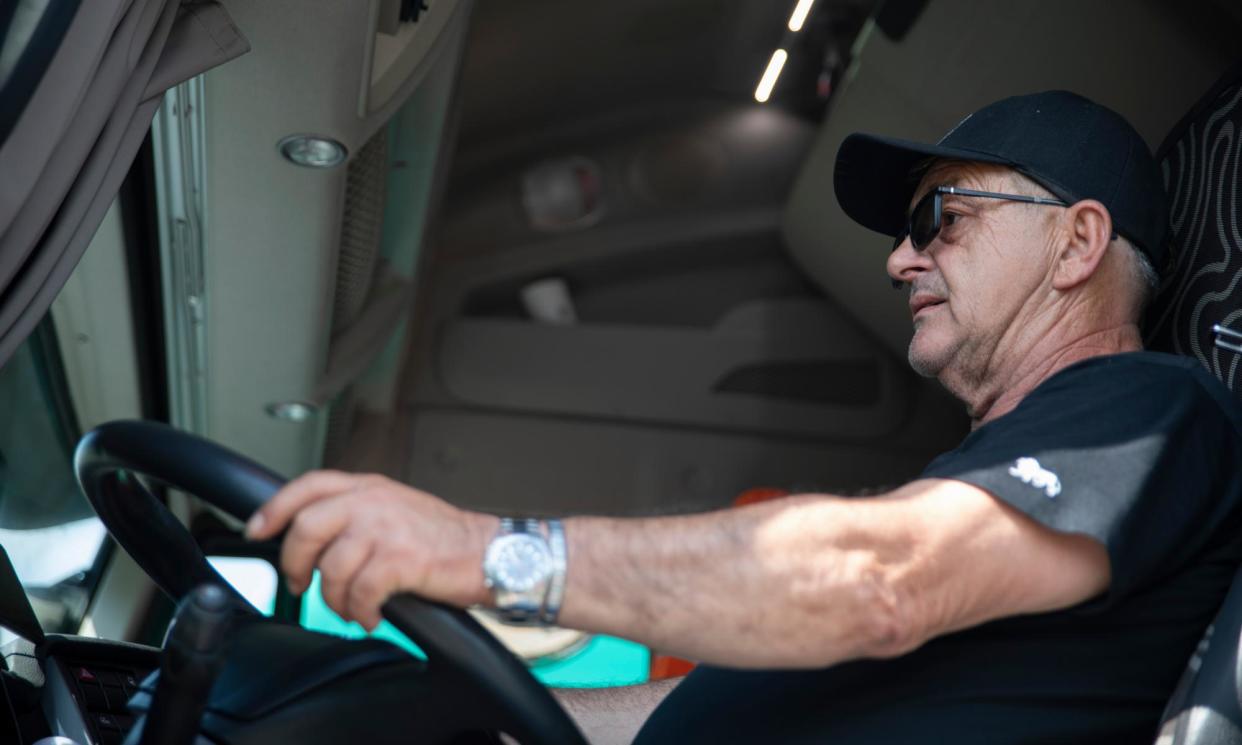Post-Brexit ‘mess’ as Italian driver’s lorry held for 55 hours at UK border post

An Italian lorry driver has described the UK’s new post-Brexit controls as a “mess” after his lorry was held at a government-run border post for more than two days.
Antonio Soprano, 62, who was stopped while bringing plants into the country from central Italy, said he was offered nothing to eat during his 55-hour ordeal and instead was told by border officials that he should walk to a McDonald’s more than a mile away to get a meal.
After eventually being released from the Sevington facility in Ashford, Kent, in the early hours of the morning, he was then clamped and had to pay a £185 fine after difficulties finding a place to park in the middle of the night.
Related: UK clothing sales to EU plummet as Brexit red tape deters exporters
It comes just over a month after the government brought in new post-Brexit rules on 30 April, which require some lorries transporting plant and animal goods from the continent to be checked at designated border control posts along the British coast.
The checks, which have been put in place to stop diseases coming into the UK, are supposed to take place within four working hours but some lorries can be held for longer if inspectors identify a potential risk.
Soprano, who drives for the Italian haulage company Marini, was taking a lorry full of plants from Italian suppliers to companies across Britain when he was ordered to drive the 22 miles from Dover to the Sevington border post for inspection.
He says that when he arrived at the facility he was immediately ushered to a waiting area and ordered to wait, with border officials taking his keys.
Soprano, who speaks no English, said no efforts were made to explain to him what was happening, claiming he was just repeatedly told by officials to wait. The waiting facilities for drivers consist of a small room with a few tables, with only water provided and no food.
He said: “They told me to go and eat at a McDonald’s, which was 2km away, so by foot. In the end I found a supermarket but we had no services apart from a toilet.”
The lorry was held because of concerns about 10 Prunus lusitanica plants in the load, which border officials thought could be carrying harmful pests.
The concerns were raised hours after the lorry arrived at 6.30pm on 26 May, and officials said the delays occurred because the plants could not be unloaded because of health and safety concerns.
The Department for Environment, Food and Rural Affairs said the initial inspection of the lorry was delayed due to the driver having to take an 11-hour rest break, known as a tacho break, while at Sevington. It said the absence of a load plan, and problems with the way the lorry was loaded, meant extra measures were needed to safely check the plants.
Officials eventually signed off the plants and allowed the vehicle to be released just after 1am on 29 May, about 55 hours after it arrived.
Prohibited from spending the night at Sevington and having to find a place to rest due to EU driver regulations, Soprano had to park in the McDonald’s car park as the nearest lorry park was full. He woke up to find that his lorry had been clamped and could only be released once he had paid a £185 fine.
He said: “I understand they need to do the controls but this behaviour is not normal, it was a mess. I don’t know why we had to wait for so long. I have to go to England for work, I have no choice, but this was not normal.”
The incident comes weeks after the Guardian reported that some lorry drivers were held for nearly 20 hours at Sevington border control post after an IT outage caused huge delays for perishable items coming into the country.
Vicenzo Marini, the chief executive of Marini, which sends 15 lorries a week to the UK, said the incident was “surreal” and the new checks and custom requirements since Brexit had made sending goods to the UK much more problematic.
He said the company, which has been transporting goods to the UK since the 1980s, was now considering abandoning its UK routes due to the new controls, as well as fears among drivers around migrants entering their lorries.
The incident comes after repeated warnings from horticultural trade bodies about the practicality of checking plant products at the border, and the ability of border staff to load and unload lorries.
Speaking to the Guardian in January, James Barnes, the chair of the Horticultural Trades Association, raised concerns over whether border control posts had the infrastructure and ability to handle the “diverse horticultural loads” coming from the continent.

 Yahoo News
Yahoo News 
